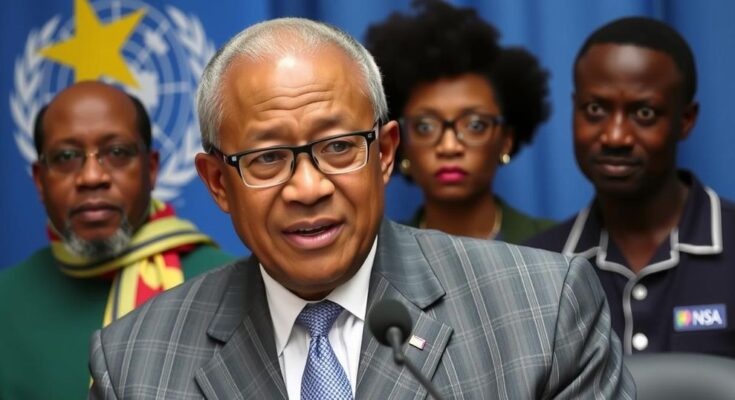The Democratic Republic of Congo has initiated its campaign for a non-permanent seat on the UN Security Council for the term of 2026-2027. Historically, it has served in this role twice and aims to utilize its extensive experience in peacekeeping to contribute to security discussions. Elections for the seat will occur in June 2025, and the DRC hopes to influence reforms in peacekeeping and conflict resolution.
On Wednesday, the Democratic Republic of Congo (DRC) officially commenced its campaign to secure a non-permanent seat on the United Nations Security Council for the 2026-2027 term during a ceremony held in Kinshasa. The Security Council, recognized as the preeminent body of the United Nations, is charged with the pivotal responsibilities of maintaining international peace and security, possessing the authority to enact binding resolutions, authorize military action, and impose sanctions.
The Council comprises five permanent members—namely China, France, Russia, the United Kingdom, and the United States—and ten non-permanent members elected by the General Assembly for two-year terms, lacking the power of veto. Historically, the DRC has served as a non-permanent member of the Security Council on two occasions: from 1982 to 1983 and once more during the Gulf War from 1991 to 1992, as highlighted by Foreign Minister Therese Kayikwamba Wagner during her address to diplomats and assembled Congolese officials.
Minister Wagner noted, “Our country played a key role in condemning Iraq for its invasion of Kuwait,” reflecting on the DRC’s significant contributions during the Gulf conflict. Furthermore, she emphasized the DRC’s extensive experience in fostering peace, citing that the nation hosts one of the largest United Nations peacekeeping forces globally, with approximately 15,000 blue helmet personnel stationed in the region.
The elections for non-permanent members of the Security Council are scheduled for June 2025. Should the DRC succeed in its bid, Minister Wagner stated that it would gain opportunities to “influence the debate on peacekeeping and peacebuilding reform, as well as the reform of the UN’s collective security system.” The DRC, characterized by its mineral-rich eastern region that has endured sustained armed conflict over the past three decades, is determined to apply its expertise in strengthening conflict-resolution mechanisms to mitigate wars and avert international tensions.
The Democratic Republic of Congo’s quest for a non-permanent seat on the United Nations Security Council is rooted in its rich history of involvement in international peacekeeping and conflict resolution. As the Security Council holds paramount authority within the UN framework, it plays a critical role in addressing issues of global security and governance. The DRC’s previous participation in the Council, particularly during the Gulf War, demonstrates its commitment to international cooperation in promoting peace. The ongoing instability in the eastern region further substantiates the DRC’s intent to leverage its experiences in global forums to advocate for effective resolutions to conflict.
In summary, the Democratic Republic of Congo has launched its campaign for a non-permanent seat on the United Nations Security Council for the upcoming term of 2026-2027. With notable historical involvement in the Council and significant experience in peacekeeping operations, the DRC seeks to contribute meaningfully to discussions on peace and security. The upcoming elections present an opportunity for the DRC to influence vital reforms and enhance its role in international conflict resolution.
Original Source: www.barrons.com




